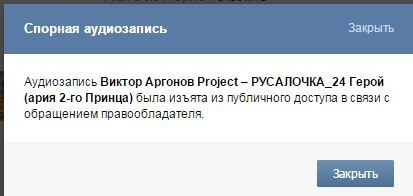VKontakte now blocks not only pirated music, but also pirated music
Yes, yes - I was not sealed in the title. We have already begun to get used to the fact that video and audio content distributed in violation of copyright may be blocked at the request of the copyright holder. What about the content that is distributed by the author himself, and partly by the copyright holder, a staunch copyright opponent and a pirate, and also under a free license?

Victor Argonov - composer, scientist and blogger from Vladivostok, author of the first operas in Russia and symphonies in the dance electronics genre - “2032”, “The Little Mermaid”, “Crossing the Line”. It has long been known to be skeptical about copyright (see, for example, his articles on intertextuality and on pop music as a victim of copyright ), he puts his materials free of charge, experimenting with alternative ways of supporting creativity. And in 2012, his work “2032” received the status of the world's first musical opera with detailed open source .
')
Given this background, the listeners were quite surprised to find that one of the composer's tracks (aria “Hero” from “The Little Mermaid”) was suddenly deleted by the Vkontakte site administration ... “at the request of the copyright holder”. Victor was shown a screenshot and asked to explain whether he now became a copywriter. But Victor was surprised no less than the audience. He asked the administration of the social network a question about the reason for the deletion and received an answer that, apparently, an error occurred. It was decided that the incident was settled.

However, more recently, the tracks from the "Little Mermaid" continued to disappear. This time - already from the official group of the project, and in an absurd way: the fragments with numbers 3, 8 and 9 disappeared, while the rest remained intact. According to the author, now he cannot even perezalit them, since they are blacklisted on Vkontakte as pirated. He again wrote a letter to the administration, this time a public one , demanding that the records be restored and the name of the attacker, at whose request they are blocked, be reported.
The reaction of the administration is still unknown, but, whatever it may be, there is a sad fact. Vkontakte conducts the absurd extrajudicial practice of censoring creative products without special connection with the real interests of the right holders. Perhaps it is not even “fighting piracy,” but simply an imitation of violent activity. Anyway, this steadily spoils the reputation of the social network, which once was a stronghold of information freedom of the RuNet and claimed the role of the All-Russian free library of any information.

Victor Argonov - composer, scientist and blogger from Vladivostok, author of the first operas in Russia and symphonies in the dance electronics genre - “2032”, “The Little Mermaid”, “Crossing the Line”. It has long been known to be skeptical about copyright (see, for example, his articles on intertextuality and on pop music as a victim of copyright ), he puts his materials free of charge, experimenting with alternative ways of supporting creativity. And in 2012, his work “2032” received the status of the world's first musical opera with detailed open source .
')
Given this background, the listeners were quite surprised to find that one of the composer's tracks (aria “Hero” from “The Little Mermaid”) was suddenly deleted by the Vkontakte site administration ... “at the request of the copyright holder”. Victor was shown a screenshot and asked to explain whether he now became a copywriter. But Victor was surprised no less than the audience. He asked the administration of the social network a question about the reason for the deletion and received an answer that, apparently, an error occurred. It was decided that the incident was settled.

However, more recently, the tracks from the "Little Mermaid" continued to disappear. This time - already from the official group of the project, and in an absurd way: the fragments with numbers 3, 8 and 9 disappeared, while the rest remained intact. According to the author, now he cannot even perezalit them, since they are blacklisted on Vkontakte as pirated. He again wrote a letter to the administration, this time a public one , demanding that the records be restored and the name of the attacker, at whose request they are blocked, be reported.
The reaction of the administration is still unknown, but, whatever it may be, there is a sad fact. Vkontakte conducts the absurd extrajudicial practice of censoring creative products without special connection with the real interests of the right holders. Perhaps it is not even “fighting piracy,” but simply an imitation of violent activity. Anyway, this steadily spoils the reputation of the social network, which once was a stronghold of information freedom of the RuNet and claimed the role of the All-Russian free library of any information.
Source: https://habr.com/ru/post/364719/
All Articles